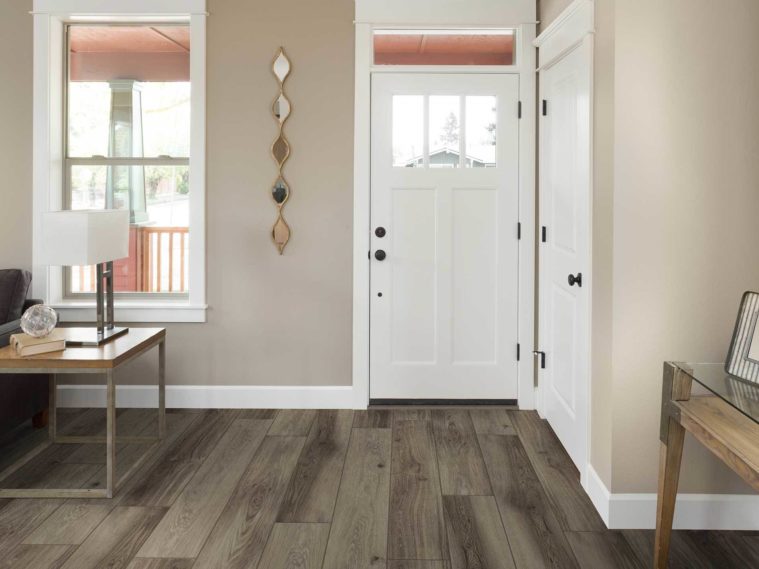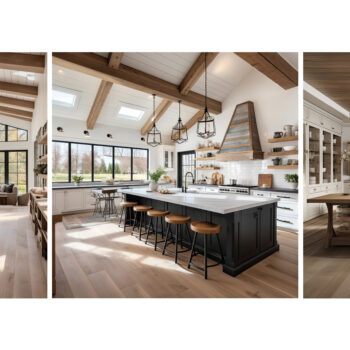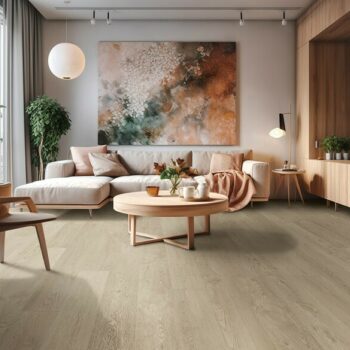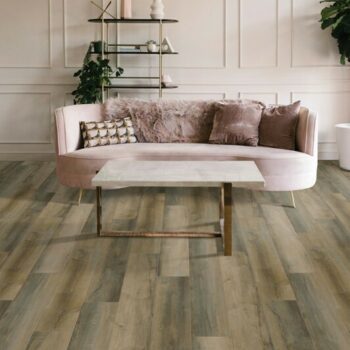
My First Floor
ShareFirst-time home buyers oftentimes buy homes that need a little TLC, or they just want to add their own touch to make it their own. One of the biggest impacts you can make to a home - both aesthetically and functionally - is replacing the floor.
If you’re a first-time home buyer, this is likely your shopping debut for floors, and it’s likely you have been hit with the realization that there are tons of flooring options, each with their unique advantages and disadvantages. To help guide you through the labyrinth of floors, here’s a quick look at the various flooring types popular for first-time homeowners and what you may need to consider when choosing your floor.
Carpet
Carpet is one of the most affordable flooring options that provides warmth and comfort underfoot and helps absorb sound. On the downside, it’s a lot of work to keep carpet looking new, and it’s not the most pet-friendly of floors. You’ll also need to consider the added cost of a good carpet pad, and it probably will need to be professionally installed. Many first-time home buyers are also considering the value of their home when they are ready to move and upgrade to a new house. Carpet just doesn’t add value to the home like other flooring types and to some potential buyers, carpet is a turnoff.
Hardwood
Hardwood floors are highly valued by homeowners and prospective home buyers, but hardwood can be one of the most expensive flooring options. A good quality hardwood floor that is going to last and perform well is going to be out of the budget for the lion’s share of first- time home buyers. There’s also added cost of installation and depending on the condition of the subfloor, it may require a fair amount of floor prep work.
Ceramic Tile
On the surface, ceramic tile can seem like a budget-friendly flooring choice for a first-time home buyer. There are lots of nice ceramic tiles in the less that $1.00/sq. ft. category. That is until you buy the substrate, mastic, grout, and sealer. It starts to add up quickly. Then there’s the maintenance of the grout, which stains and chips and can ruin the look of a ceramic tile floor, and it’s a pain to keep clean. In fact, there are a lot of benefits to installing grout-less flooring.
Laminate
Laminate can provide an inexpensive, nice-looking representation of a hardwood or tile floor. The Achilles heel of laminate floors is the HDF (High Density Fiberboard) core that is susceptible to moisture, which can cause swelling, cupping, and warping if exposed to moisture over an extended period. Think about your refrigerator leaking water and you aren’t aware of it until you see it affecting the floor. Laminate floors have a locking system that does allow the homeowner to do a DIY installation, representing a bit of savings to the flooring budget.
Waterproof Floors
Waterproof floors are the most popular in the industry and offer a seemingly endless choice of design options. There are a couple of categories that are folded into waterproof floors – WPC, which is lighter and more resilient, and SPC, which is heavier and denser than WPC. SPC is more dent resistant than WPC, but WPC is more comfortable underfoot than SPC. Typically, SPC is the less expensive of the two, but either can be worked into a new homeowner’s tight budget. Both are waterproof and very durable. The technology used to create designs on these floors makes them look very realistic with high definition of the design and texture that mimics the real thing. Waterproof floors use a glueless locking system making them DIY friendly, which equals savings if you are willing to invest a little sweat equity.

Inception Waterproof SPC Floor by Metroflor
Metroflor’s Inception SPC and Genesis WPC provide a wide array of high performing, well styled, and affordable floors for new homeowners looking to make their first home improvements. You can also use the dealer locator to find a Metroflor dealer nearby using your zip code at metroflor.com.

Genesis Waterproof WPC Floor by Metroflor
Buying floors for your first home can be daunting, but with a little research you can choose a floor that is perfect for your home and your budget. Don’t be afraid to ask your retail sales associate for some advice about what the best floor is for your needs. And it’s a good idea to have a retailer come and measure the room so that you order enough to cover any mistakes or crazy cuts that may take more material.
New home buying and renovations can be a bit of a roller coaster ride, but in the end, just like a roller coaster, it’s an exhilarating experience when it’s all said and done.
Read the Latest Style News

Mar 15, 2024
Are There Different Types of Farmhouse Styles?

Feb 21, 2024
How to Bring Art into Your Living Spaces

